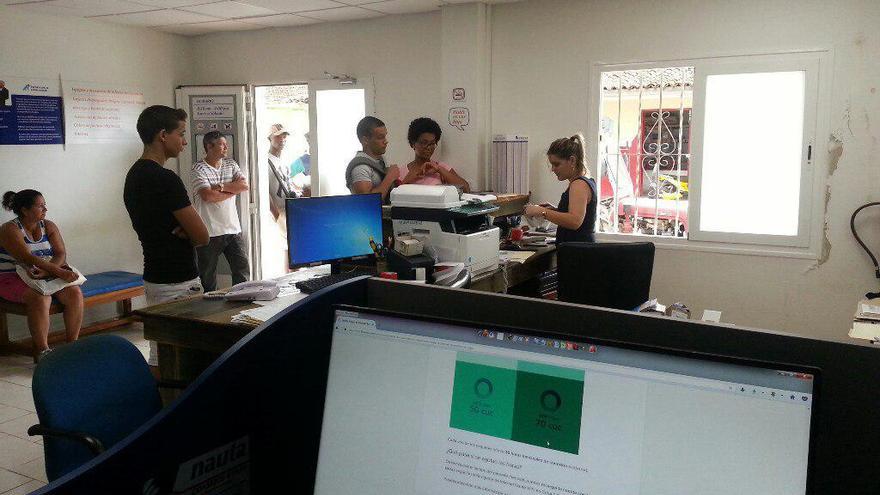
The Cuban telecommunications company on Tuesday announced the first flat rate for web browsing for private workers on the island. (PEC).
Etecsa assures on its website that the measure will “strengthen the Cuban computer applications and services industry” and aims to improve “the performance and functioning” of private workers.
According to the legal definition, the computer equipment programmer is someone who “develops, markets, implements, implements, and provides technical support for computer programs, applications and services through contracts with natural or legal persons”. Most of those who have that license on the island are dedicated to programming software, create applications and install programs.
The connection speed depends on the technical conditions required by the companies
The number of people who will gain access to the service is difficult to pinpoint because the PEC permit, which began to be issued with the economic reforms Raúl Castro promoted over the past decade, was halted in 2017 when the government started a lawsuit. to regulate and order self-employment.
It was only in February of this year that the reopening of the supply of PEC licenses was announced, but so far and according to testimonials collected by 14ymedio, the new licensing will be halted until the new list of private professions enters into force.
The programmer’s flat-rate service enables Internet access through asymmetric digital subscription line (ADSL) technology. “This offer includes the installation and contracted data service through the use of digital links that permanently connect its computer network to other networks, in accordance with the quality specifications defined,” explains Etecsa in its statement.
The connection speed depends on the technical conditions required by the companies, the service has no time restrictions and offers the option to enable international mail.
Prices vary according to the internet speed required: 512/128 Kbps, at 1,250 pesos per month, up to the maximum offered, namely 6,144 / 1,024 Kbps at a cost of 24,125 pesos, the latter the equivalent of 1,000 USD per month service.

Regarding hiring Nauta Hogar: the modality is paid afterwards and the self-employed person must have a Nauta account. If you don’t have it, “one is enabled for free and you can recharge using one of the established routes.”
Etecsa clarifies that the Nauta Hogar will have a connection speed of 2,048 / 1,024 Kbps and that activation will cost 250 pesos. The monthly price depends on the service contracted: 240 hours for 2,000 pesos (8.30 CUP / hour) or 480 hours for 3,000 pesos (7.20 CUP / hour). The additional hourly rate for the two offers costs 12.50 pesos.
Criticism of the services announced by Etecsa has not been long in coming. Most comments on the official site Cubadebate regret the high prices of the flat rate and the obligation to apply for a PEC license to apply for it.
“The offer is appreciated, the price was far exceeded, taking into account the international costs for a faster service,” said an internet user named Pedro. An opinion shared by reader Raly: “Why doesn’t Etecsa make special offers for teachers and students who need so much in these days of connectivity? Why don’t they sell us phones in the currency they pay us with?”
“How much revenue does a programmer need to make one of these offers profitable?” Asks Sixto, another commenter. “These offers could be profitable for a group of programmers between the ages of three and five who are associated as SMEs. But small businesses are not just approved.
“The offer is appreciated, the price was far exceeded, taking into account the international costs for a faster service”
Self-employed persons interested in Etecsa’s offers should submit the request by email to [email protected]. The documents to be sent are: photocopies of the authorization card to perform work on behalf of PEC and the identity card, a signed request stating the connectivity package to be hired and, “if the stakeholder does not own the telephone line where the service will be provided. installed, must send written permission from the owner “. After the request is approved, they will let the client know which office to contact to sign the contract.
Flat rate access has been one of the most repeated demands of state monopoly customers in recent years. The # BajenLosPreciosDeInternet campaign reached its peak in mid-2019. In the first edition, the label was popular topic within the island.
Etecsa responded by describing the campaign promoters as “mercenaries” and blamed the US embargo for the high prices of services.
Collaborate with our work:
The team of 14ymedio He is committed to serious journalism that reflects the reality of deep Cuba. Thank you for coming this long way with us. We invite you to continue to support us, but this time by joining our newspaper. Together we can continue to transform journalism in Cuba.